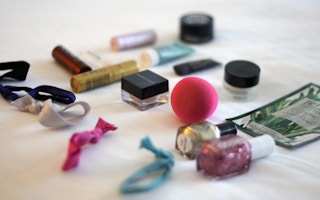Cosmetics are part of a multi-billion dollar global industry expected to reach $675 billion by 2020. As with most industries today, one of its fastest growing influences on consumer purchasing behavior are claims for sustainability.
Sustainable sourcing of raw materials in cosmetics is gaining popularity, and many cosmetics manufacturers have launched “take-back” recycling initiatives, engaging customers with a solution for its difficult-to-recycle products and packaging. The trend we are seeing is clear: recyclability and perceived sustainability are en vogue.
Though all technically recyclable, “difficult-to-recycle” waste streams are not typically profitable to recycle in our current infrastructure. Cosmetics are often packaged in containers that are hard to clean, and the packaging is often comprised of mixed materials (e.g. a pump-action bottle made with different plastic resins and a metal spring).
With high collection, separation, and processing costs, cheap, linear disposal methods like landfilling and incineration are typically considered the most economically viable options. Even so, consumer demand for greater responsibility and more circular waste solutions is resonating across industries, cosmetics included.
We know that consumers are more likely to patronize companies committed to making positive social and environmental impacts, so it’s no wonder that we are seeing an influx of marketing and advertising campaigns calling upon consumers to send or bring them their full or empty cosmetics containers for recycling.
It’s great that sustainability and recycling are more salient topics in the consumer products market today, but distinctions must still be made.
While there are plenty of companies using sustainability as a platform to enhance their CSR strategies, reduce their environmental impact, and build trust with consumers, not all companies jumping onto the sustainability train are using this platform in socially responsible, transparent ways.
Leading consumer category site InStyle queries “Did you know that product packaging makes up almost 45% of the trash found in landfills? Luckily, many brands…have found creative ways to reduce that number—by rewarding you with a new product or a discount toward your next purchase when you recycle your empty products.”
At TerraCycle, we’ve developed a great deal of first-hand experience in the sustainability of consumer products, and have seen companies on every point of the spectrum.
One high-end consumer cosmetics company incentivizes sending in several of their products at a time (from their brand and their brand only) with the reward of one free item, while another major personal care company accepts all brands of full or empty cosmetic products and packaging for recycling, but does not provide consumers information about what they do with them upon collection.
One French perfume retailer even hosted a take-back program for the packaging of all brands sold in-store. When asked by a TerraCycle associate how they recycled the waste, they answered that they did not currently have a solution in place.
A more regenerative system in which collected waste materials are used as a resource to create new products is what recycling is actually about. For example, years ago my company TerraCycle partnered with Garnier to create the Personal Care and Beauty Recycling Program, a free program that accepts everything from shampoo and conditioner bottles, eye cream tubs and hair spray pumps for recycling.
“
Consumers vote for products with their wallets, and consumer vigilance for superficial sustainability claims are more important than ever.
To enhance our recycling initiative’s impact, the program itself is brand agnostic: all personal care and beauty waste is accepted for recycling, regardless of brand. Waste collected through the program is recycled into plastic pellets to make new recycled products, even more ambitious creations like community gardens or playground.
Not only is Garnier putting forth the resources to collect and recycle all brands of cosmetics packaging, it creates a reward system much greater than a free gift: the opportunity to give back to the community.
TerraCycle also just launched the Beauty Products Recycling Program with L’Oreal in Australia, where 21.1 million tons of waste end up in landfills each year. Consumers are empowered by the ability to easily (and at no cost to them) send their discarded beauty products for recycling, without the caveat that it must be from one brand.
Participants in the program do not have to buy products to benefit, and can even earn points redeemable for a charitable donation or upcycled products.
Consumers concerned with the sustainability of their cosmetics products, whether it be where the raw materials are sourced or where the “recycled” materials from a take-back program will end up, should be asking these companies directly several important questions:
- Who is the company working with to make their initiative possible?
- What are they doing with the materials?
- When are they planning to share a report on the results and outcomes of their program?
- Where are the discarded cosmetics being processed?
- How are they being recycled?
Consumers vote for products with their wallets, and consumer vigilance for superficial sustainability claims are more important than ever.
There are clearly solutions for difficult-to-recycle waste streams when companies provide the resources necessary to make them possible, and consumers have the influence to reward them instead of the many brands, retailers and companies that are jumping on the sustainability trend for profit.
Tom Szaky is the founder and CEO of TerraCycle, a global company that recycles hard-to-recycle waste through various innovative platforms. This article was originally published on Huffington Post and is republished with permission.











